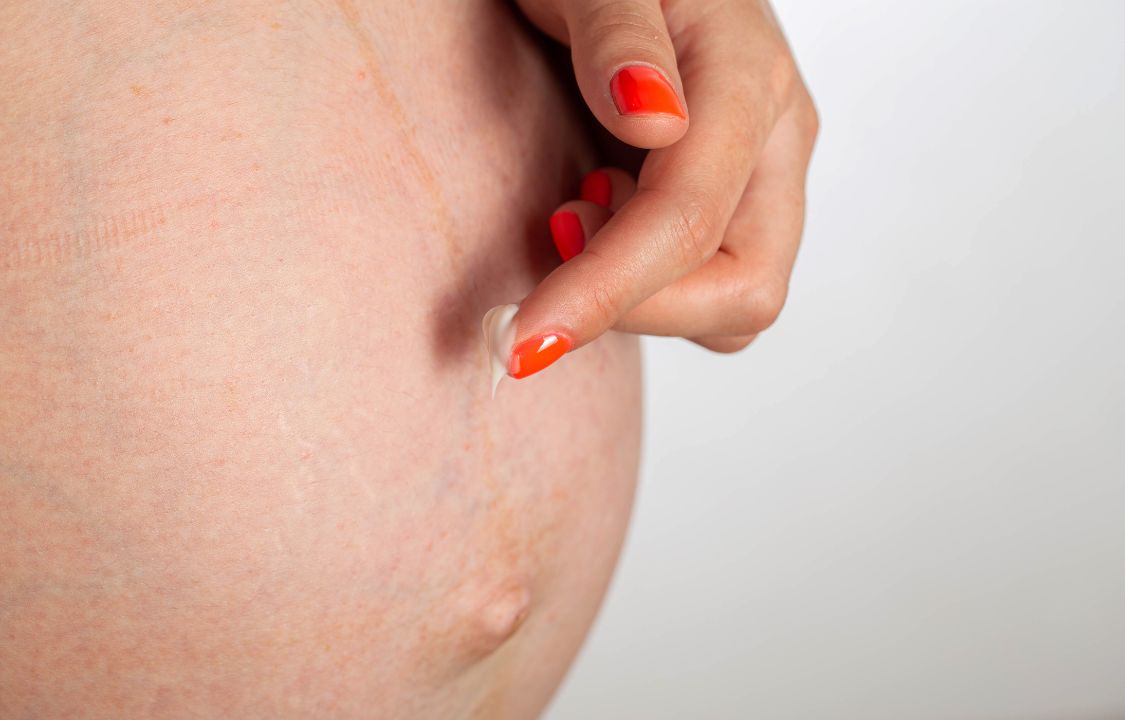Health Care, Insight
How My Skin Changed During Pregnancy
From moles to skin tags to cherry angiomas, here’s how skin can change during pregnancy and what to watch out for.
Pregnancy is a transformative journey for individuals, marked by profound physical and emotional changes. Among these changes, shifts in skin pigmentation due to increased melanin production take center stage. While many are familiar with the “mask of pregnancy,” or melasma, fewer are aware of the myriad other ways pregnancy can affect the skin. In this comprehensive exploration, we delve into the intriguing world of skin changes during pregnancy, sharing personal experiences, medical insights, and recommendations for navigating this transformative period with confidence.
Personal Experience
In the midst of pregnancy, individuals often experience surprising and sometimes unsettling changes in their skin. Personally, I noticed the development of skin tags during this time. These small, benign growths often appeared in areas where skin rubbed against clothing or other skin. Intriguingly, many of these skin tags mysteriously disappeared or fell off after childbirth, leaving me to wonder about the peculiar dynamics at play within my own body. Furthermore, I observed an increase in moles and darker freckles on my skin, all of which were part of the constellation of pregnancy-related changes that unfolded before my eyes.
Understanding the Range of Skin Changes
While personal experiences are valuable, it’s essential to recognize that skin changes during pregnancy can vary widely among individuals. Therefore, it’s crucial to be informed about what can be considered normal. One common occurrence is the appearance of cherry angiomas, tiny dark red spots that can crop up on the skin’s surface. Unlike many other pregnancy-related skin changes, cherry angiomas may persist even after pregnancy. In my case, one such spot on my knee raised concerns as it grew and became raised. To address these worries, I consulted a dermatologist who performed a comprehensive skin check and decided to remove the spot. Although the biopsy was conducted primarily to rule out the possibility of it being an errant Spitz nevus, it was ultimately determined to be a benign cherry angioma. This experience underscores the importance of professional consultation and vigilance in monitoring skin changes during pregnancy.
Anxiety and Skin Changes
It is not uncommon for individuals to experience anxiety when they notice alterations in their skin during pregnancy. This anxiety is partly rooted in the fact that nearly one-third of malignant melanoma cases are diagnosed in individuals during their childbearing years. While it’s essential to emphasize that pregnancy itself doesn’t increase the likelihood of developing melanoma, it’s possible for individuals to mistake skin cancer for pregnancy-related skin changes. This underscores the critical importance of closely monitoring such changes and seeking professional evaluation when in doubt.
The Hormonal Connection
The intriguing connection between pregnancy and skin changes can be attributed to hormonal mediators, as proposed by Dr. Keyvan Nouri in the book “Skin Cancer.” Dr. Nouri’s hypothesis gains substantial support from studies cited in a 2017 article that explores the link between pregnancy and malignant melanoma. These studies suggest that hormonal fluctuations during pregnancy may contribute to the onset of malignant melanoma. Furthermore, hormonal changes occurring after puberty can also influence alterations in pigmentation.
Consulting a Dermatologist
Given the multifaceted nature of skin changes during pregnancy, it is advisable to consult a dermatologist when such transformations are observed. Several benign growths are commonly associated with pregnancy, including skin tags, seborrheic keratoses (wart-like spots in brown, black, or light tan), and pyogenic granulomas (small, raised, red bumps that bleed easily). While these changes are typically benign and tend to resolve after childbirth, seeking professional advice can help alleviate anxiety and ensure proper identification and management. Dermatologists possess the expertise to distinguish between benign and potentially concerning skin changes, providing reassurance to expectant individuals.
The Importance of Regular Skin Examinations
Pregnancy serves as a poignant reminder of the significance of regular skin examinations by a dermatologist. These examinations are not only advisable for pregnant individuals but for everyone, regardless of their life stage. Monitoring any changes in the skin and ensuring the early detection of potential issues is a proactive approach to skin health that should not be underestimated. By staying vigilant and proactive, we can ensure a safe and healthy pregnancy experience.
Conclusion
Pregnancy is a profound and transformative journey, and it brings about a multitude of changes in the human body. Among these changes, skin alterations can be both surprising and, at times, worrisome. From the emergence of skin tags and the darkening of moles and freckles to the appearance of cherry angiomas, the range of skin changes during pregnancy is diverse. While most of these changes are benign and resolve after childbirth, it is essential to consult a dermatologist to rule out any potentially concerning issues and alleviate anxiety.
The hormonal connection between pregnancy and skin changes, as proposed by Dr. Keyvan Nouri, adds depth to our understanding of this phenomenon. Hormonal fluctuations during pregnancy can influence the onset of conditions like malignant melanoma, making close monitoring of skin changes crucial.
In summary, it is essential to emphasize that staying well-informed about the specific skin care needs during pregnancy, actively seeking guidance and expertise from healthcare professionals, and diligently scheduling and attending regular skin examinations with a qualified dermatologist are the fundamental cornerstones for preserving and enhancing skin health throughout the course of pregnancy. By wholeheartedly embracing this proactive and attentive approach, we can not only navigate the incredible journey of pregnancy with a profound sense of assurance but also fully celebrate and embrace the transformative changes our bodies undergo, all while ensuring the utmost protection and well-being of our skin.

